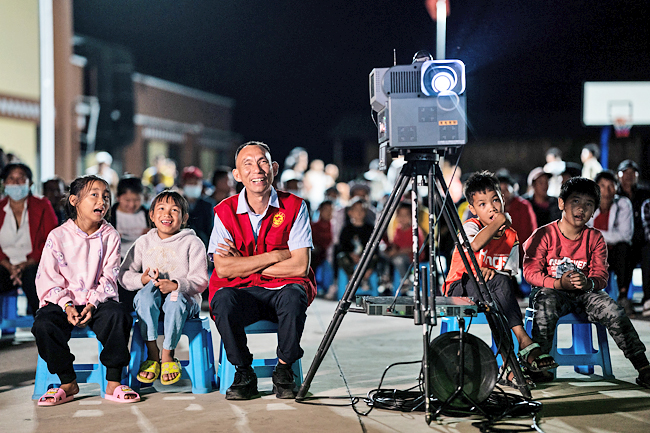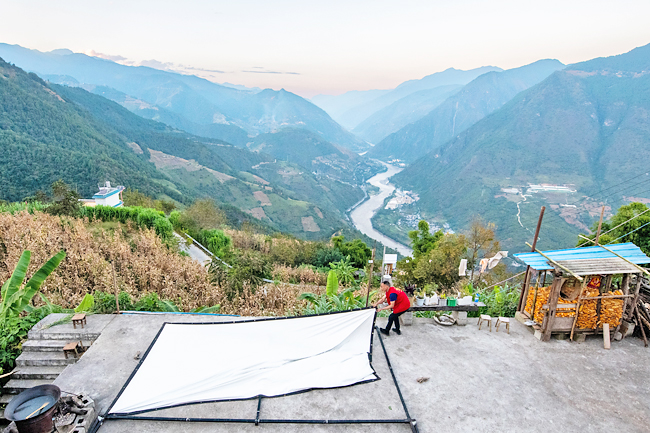KUNMING (XINHUA) – As day turns to night, Yang Mingjin sets up a big cloth screen, ready to project a movie free of charge for the locals living deep in the mountains.
Over the past 24 years, this tyre-shop owner has provided more than 4,500 screenings here in the city of Lushui, Nujiang Lisu Autonomous Prefecture, Yunnan Province. In the process, the 45-year-old movie buff has provided around 500,000 free seats, lighting up the lives of rural residents in this remote corner of southwest China.
CHILDHOOD DREAM
The white pickup truck bumped on the winding mountain road, heading for the mountain top. Arriving at the outdoor screening venue, Yang moved some machines, adjusted the equipment and set up the stereo speakers.
Finally, the mountain was alive once more with the light of the projector. The music sounded, attracting nearby villagers who gathered in front of the screen.
The film being screened was The Captain, a Chinese blockbuster based on a real-life emergency airplane landing. The audience stared at the screen, their mood fluctuating with the plot.
After the break, several children gathered in front of the projector, one of them asking, “Did the light come from here?”
The scene reminded Yang of his own childhood. When he was around the same age, he found himself hiding in a hole in the night. The loudspeakers of his village had announced the screening of a movie: “A colourful spy war movie will be screened tonight…”




He had come running to the screening venue but had no money to buy a ticket. So he found a hole in the corner of the barrier, lay on the ground and wriggled through. However, he was soon spotted by the ticket seller, who ejected him from the audience. The scene was an embarrassing one for the youngster.
Later, he found a better way to get inside, swapping eggs for a ticket. For the first time, he was able to watch a whole film from start to finish. That night, as he lay in bed, his mind was full of movie images. He suddenly had a flash of inspiration, a dream to pursue: “In the future, I must let everyone watch films for free!”
In 1998, Yang graduated from an auto-repair school and bought a projector to screen films for local people in his spare time.
Later, a rural public welfare film screening project was implemented nationwide, and Yang joined as a film projectionist.
Since then, he has gone from village to village, sharing his passion for movies.
SCREENING FILMS WITH PRIDE
“Do people in the movies also speak our Lisu language?” came a question from the audience.
Yang had arrived in Laimao Village, setting up his equipment and showing a film in the local language. The audience was gripped by this new phenomenon, which caused much discussion.
One old man took Yang’s hand and said in Lisu, “This is the movie I have ever understood the most.”
At that moment, Yang felt great pride.
Three months before then, he was in the same village to screen a film. A villager came over and said, “It would be better if the film was in the Lisu language.” Yang suddenly realised that the old man was happy to watch films but could not understand them properly.
He called the film studio and learned that a technology could be applied to convert the dubbing into the Lisu language. After three months of hard work, Yang figured out how to record the new dubbing.
On the day of the official screening, he put on a fresh white shirt, climbed onto his motorcycle and took his projector to the village. He felt it was an important moment.
It seemed that everyone, young and old, had turned out to watch the movie. With all the seats in the field taken up, some viewers perched on a nearby roof, while others climbed up the tree. Yang felt that all his hard work had paid off, and he felt glad to be making so many people happy.
THE LIGHT OF HOPE
In 2018, Yang’s younger daughter died in a liquefied gas explosion at home. His wife was also injured.
Over the following two years, Yang accompanied his wife to the provincial capital Kunming for treatment. The financial cost was considerable, but he received much help from the government, as well as donations from kind well-wishers.
Yang said that, in the darkest moments of his life, it was films that gave him strength. “If there weren’t any movies, I might not have survived,” he said. “People in movies can persevere and overcome all kinds of obstacles, so why can’t I?”
These days, Yang’s wife is gradually recovering, and Yang is still showing films.
At the end of last year, Yang screened movies at the Hexie residential community, where residents had been relocated from inhospitable areas.
“Hey! Do you remember me?” said a little boy, suddenly jumping out and patting Yang on the arm. Yang looked intently and recognised the boy as Zhang Jun, who used to live high on a mountain and often came to help when he showed films.
Yang was overjoyed. He had not seen the boy for two years. Zhang looked well, no longer in ragged clothes. The boy said that his new home was warm and there were no power outages anymore.
With more villages now accessible by road, Yang no longer has to climb mountains carrying equipment on his shoulders. Many villages among the more remote mountains have been moved to resettlement sites, with the people bidding farewell to a life without material comforts. They also have a richer array of recreational activities to enjoy.
However, Yang’s films are still popular with the mountain dwellers, and his open-air cinema never closes.



